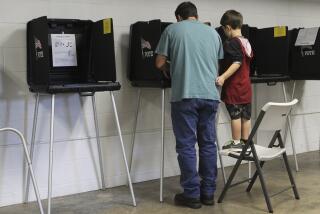House OKs Bill to Allow Local Census Reviews
- Share via
WASHINGTON — Plans for the 2000 census sank further into a partisan quagmire Wednesday as a sharply divided House of Representatives approved a measure allowing local governments to review and challenge whatever figures emerge from the decennial population count.
The bill is the Republican answer to Democratic efforts to use a method known as statistical sampling to correct chronic errors in the traditional door-to-door head count.
The House vote did not appear likely to settle an issue that has festered since a Supreme Court ruling this year forced the Clinton administration to limit its use of population sampling in the census. That issue is: What steps will the federal government take to improve a counting process that historically has missed a sizable number of residents in poor, immigrant and ethnic minority communities?
Prospects for the “post-census local review” bill in the Senate are unclear. Even if the bill succeeds there, Clinton administration officials would recommend a presidential veto. The margin of approval in the House, 223 to 206, fell far short of the two-thirds required to override a veto.
The vote, largely along party lines, showed the depth of the split on how to tally America’s population as Congress considers funding for the Commerce Department, the agency that oversees the Census Bureau. None of California’s 52 representatives broke party ranks.
Republicans argued that the census should stick to the constitutional mandate of an “actual enumeration” and that local governments were best equipped to spot and fix counting errors. Democrats contended that Republicans were trying to revive a program that flopped in 1990 in an effort to prevent a more effective means of quality control--a scientific population sample.
Although both parties depicted themselves as guardians of objectivity, accusations of political gamesmanship flared frequently.
“Why does the majority want to repeat 1990 with all those undisputed errors?” said Rep. Carolyn B. Maloney (D-N.Y.), the bill’s leading opponent. “Because they believe that errors in the census are to their political advantage.”
In response to what he called a “malicious diatribe,” House Majority Leader Dick Armey (R-Texas) said: “Suffice it to say that it is commonplace among the Democrats for them to accuse us of what they themselves are doing.”
Much is riding on how the census is conducted. The population data are used to apportion congressional seats among the 50 states; help states draw district boundaries for thousands of local, state and federal elective offices; help direct more than $150 billion a year in federal aid to states; and guide countless other public and private inquiries into American demographics as the country enters the next millennium. The census is scheduled to begin April 1, 2000.
In 1990, according to government estimates, the census overlooked roughly 4 million people nationwide, including more than 800,000 in California. As a result, one federal study found, the state lost about $220 million a year in federal funds.
The Supreme Court ruling in January barred the Clinton administration from using statistical sampling to apportion congressional seats to the states--disrupting administration plans. But Commerce Department officials say the ruling allowed them to use sampling to improve data for other purposes, including redistricting.
On its face, the measure approved Wednesday was not about sampling. Instead, it aimed to give local governments 45 working days--in effect, nine weeks--to review preliminary data from the census head count before the figures could be declared final. Census officials could then adjust figures if local officials raise valid complaints.
A similar program in 1990--giving local officials just 15 working days, however--produced what Census Bureau officials call disappointing results. It added 125,000 people to the 1990 population, or about one-twentieth of 1% of the final total.
Census Bureau Director Kenneth Prewitt has said the Republican bill, if enacted, would “adversely affect the timing and quality of census operations,” including the bureau’s plan to take a statistical sample of 300,000 households across the country after conducting the traditional head count.
Many large cities, including Los Angeles, oppose the Republican bill. The National League of Cities favors the bill but also supports population sampling, according to a spokeswoman.
The census dispute, tied to the appropriations process, has threatened to hold up funding for the Commerce, Justice and State departments and the federal judiciary after June 15. But some in Congress and the administration predict a deal will be worked out to avoid a partial government shutdown.
More to Read
Get the L.A. Times Politics newsletter
Deeply reported insights into legislation, politics and policy from Sacramento, Washington and beyond. In your inbox twice per week.
You may occasionally receive promotional content from the Los Angeles Times.










